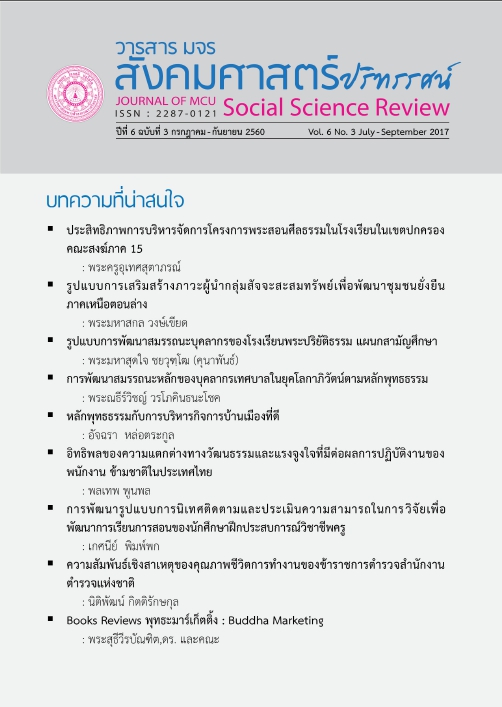การแต่งงานข้ามวัฒนธรรม: การเปลี่ยนแปลงสถานะทางเศรษฐกิจ สังคม วัฒนธรรมของหญิงไทยและครอบครัว ในจังหวัดนครราชสีมา
คำสำคัญ:
การแต่งงานข้ามวัฒนธรรม การเปลี่ยนแปลงทางเศรษฐกิจม สังคม วัฒนธรรม เหตุผล ทางเศรษฐกิจบทคัดย่อ
บทความวิจัยนี้มี วัตถุประสงค์ คือ 1.เพื่อศึกษาประวัติความเป็นมาของการแต่งงานข้ามวัฒนธรรม และ 2. เพื่อศึกษาการเปลี่ยนแปลงสถานะทางเศรษฐกิจ สังคม วัฒนธรรมของหญิงไทยและครอบครัว ในจังหวัดนครราชสีมา พื้นที่วิจัยได้แก่ อำเภอเมืองนครราชสีมา อำเภอเสิงสาง และอำเภอพิมาย กลุ่มตัวอย่างจำนวน 87 คน ถูกคัดเลือกโดยการคัดเลือกแบบเจาะจง แบ่งออกเป็น
3 กลุ่ม คือ 1. กลุ่มผู้รู้ (Key Informant) จำนวน 42 คน 2.กลุ่มผู้ปฎิบัติ(Casual Informant)
30 คนและกลุ่มที่เกี่ยวข้องทั่วไป(General Informant) จำนวน 15 คน การวิจัยครั้งนี้ เป็นการวิจัยแบบคุณภาพ(Qualitative Research)โดยรวบรวมข้อมูลจากเอกสารและงานวิจัยที่เกี่ยวข้อง เครื่องมือวิจัยได้แก่ แบบสังเกต แบบสัมภาษณ์ และแบบบันทึกการสนทนากลุ่ม นำเสนอผลการวิจัยโดยพรรณนาวิเคราะห์
ผลวิจัยพบว่า
เมื่อปี พ.ศ. 2507 ได้เกิดสงครามเวียดนามขึ้น จอมพลถนอม กิติขจร ได้ลงนามในข้อตกลงยอมให้กองทัพสหรัฐฯตั้งฐานทัพในประเทศไทย ทำให้หญิงไทยหลายคนเต็มใจเข้าสู่อาชีพภรรยาเช่าและโสเภณีบางคนได้แต่งงานถูกต้องตามกฎหมายปัจจุบันการแต่งงานของหญิงไทยกับชายชาวต่างชาติส่วนใหญ่เป็นเรื่องของเหตุผลทางด้านเศรษฐกิจปัญหาที่พบได้แก่หญิงไทยส่วนใหญ่ไม่ได้ตระหนักถึงความสำคัญของการแต่งงานที่ถูกต้องตามกฎหมายและไม่ตระหนักถึงสิทธิพึงมีพึงได้ของภรรยาหลังแต่งงาน การแก้ไขปัญหาโดยการบูรณาการทั้งปัญหาและแนวทางแก้ปัญหาที่เกี่ยวข้องกับการเปลี่ยนแปลงทางเศรษฐกิจ สังคม และวัฒนธรรม น่าจะเป็นแนวทางที่เหมาะสมและยั่งยืนโดยยึดถือทฤษฎีการแต่งงานและครอบครัว(Marriage and Family Theory) กับ ยึดแนวคิดเกี่ยวกับการแต่งงานข้ามชาติ(Cross Cultural Marriage)และแนวคิดกับการเปลี่ยนแปลงทางสังคมและวัฒนธรรม(Social and Cultural Change)
เอกสารอ้างอิง
Office of Strategy Administration of Central Northeast Region. (2554). Strategic Plan of Central Northeast Province Cluster : Roi et, Konkhaen, Maha-
sarakam, Kalasin; “ Roi Kaen Sarn Sin” 2553-2556. Khon khaen: Office of Strategy Administration of Central Northeast Province Cluster.
Phinyo Phuthet. (2559). Conservation and Development of Folk Music Culture of Community based Learning. Journal of MCU Social Science Review, 5(3), 231 – 240.
Ranee Isichaikul and Others. (2558). Thai Agro Tourism Development for Welcoming ASEAN Tourists. Bangkok: National Research Commission and Office of Research Support Fund
Roberts, L., & Hall, D. (2001). Rural Tourism and Recreation: Principles to Practice. Cambridge: CABI Publishing.
ดาวน์โหลด
เผยแพร่แล้ว
รูปแบบการอ้างอิง
ฉบับ
ประเภทบทความ
สัญญาอนุญาต
ลิขสิทธิ์ (c) 2018 วารสาร มจร สังคมศาสตร์ปริทรรศน์

อนุญาตภายใต้เงื่อนไข Creative Commons Attribution-NonCommercial-NoDerivatives 4.0 International License.
เพื่อให้เป็นไปตามกฎหมายลิขสิทธิ์ ผู้นิพนธ์ทุกท่านต้องลงลายมือชื่อในแบบฟอร์มใบมอบลิขสิทธิ์บทความให้แก่วารสารฯ พร้อมกับบทความต้นฉบับที่ได้แก้ไขครั้งสุดท้าย นอกจากนี้ ผู้นิพนธ์ทุกท่านต้องยืนยันว่าบทความต้นฉบับที่ส่งมาตีพิมพ์นั้น ได้ส่งมาตีพิมพ์เฉพาะในวารสาร มจร สังคมศาสตร์ปริทรรศน์ เพียงแห่งเดียวเท่านั้น หากมีการใช้ภาพหรือตารางหรือเนื้อหาอื่นๆ ของผู้นิพนธ์อื่นที่ปรากฏในสิ่งตีพิมพ์อื่นมาแล้ว ผู้นิพนธ์ต้องขออนุญาตเจ้าของลิขสิทธิ์ก่อน พร้อมทั้งแสดงหนังสือที่ได้รับการยินยอมต่อบรรณาธิการ ก่อนที่บทความจะได้รับการตีพิมพ์ หากไม่เป็นไปตามข้อกำหนดเบื้องต้น ทางวารสารจะถอดบทความของท่านออกโดยไม่มีข้อยกเว้นใดๆ ทั้งสิ้น





